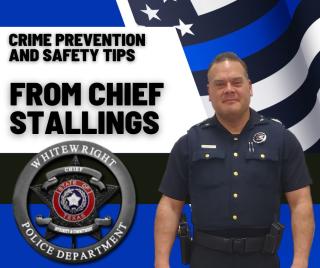2/06/23 Crime Prevention Tips

Today, I thought I would pass along some information regarding criminal trespass, residence status, and processes for removing someone from your home.
This is perhaps one of the most misunderstood concepts of Texas law, mostly because the law actually isn’t that clear. Most of the time it comes down to the length of time before a person becomes a guest, versus a tenant. Keep in mind that NONE OF THIS IS LEGAL ADVICE. The purpose of this is to inform citizens on the overall definitions of trespassing, and how to better mitigate the issue if you encounter it.
Let’s look at a couple of definitions from the Texas Property Code, Title 8, Chapter 92:
"Lease" means any written or oral agreement between a landlord and tenant that establishes or modifies the terms, conditions, rules, or other provisions regarding the use and occupancy of a dwelling.
"Tenant" means a person who is authorized by a lease to occupy a dwelling to the exclusion of others and, for the purposes of Subchapters D, E, and F, who is obligated under the lease to pay rent.
(NOTE: Subchapter “D” relates to requirement of doorknobs and locks, “E” relates to a landlord having to disclose ownership info, addresses, and “F” requires smoke alarms and fire extinguishers. This is mainly for hotels and apartments, but for this discussion we will talk about your home itself.)
You may think this stuff about a lease and landlords has nothing to do with it, but as far as the courts (civil and criminal) it does. Let us take a common scenario:
Your friend is down on their luck and wants to stay at your place for a “little while.” A little while becomes a couple of weeks, then a month. They may even get their mail at your address. You ask them about leaving, and they say they aren’t ready. This may be a familiar situation to a lot of people.
Police are usually called to “kick them out.” After all, it’s YOUR house, YOU pay the mortgage, bills, maintenance, and so on. Your now ex-friend contributes nothing. Surely the police can make them leave?
Well…
According to how the law is interpreted, you are the landlord, and they are a tenant. You have an oral agreement (lease) that they could stay there. Rent or other compensation wasn’t discussed, neither were clear length of stay determined.
I bet I know what you’re thinking right now, and I get it! But wait. It gets even better…
According to the Texas Family Code 71.004 and 71.005, you are now considered “family.” More on that perhaps another time. Let’s see how we can get this person out of your house!
There is no criminal offense as of yet, because your friend has a legal right to live there. They have a right to come and go as they please, unless they are committing an act of Family Violence (see Family Code 71.004) or other serious offense.
Ok, so what should you do? What CAN you do? The best option is to file for an eviction. This is a civil process and has specific steps that must be followed. All in all, it can be a month before your friend is forced to vacate. At the end of this discussion, I will post a link to Grayson county’s checklist for evictions.
It can be a hassle, but to avoid this please consider the following tips so that it doesn’t get to that point.
If you let someone stay and it might “be a while,” it would be best to define how long that is. Also, what other stipulations are there, like rent or utilities. As stated before, a lease can be oral, but it’s always better to get something in writing, signed, even notarized. I personally recommend consulting a lawyer about it all as soon as you can.
It’s not mean or cruel to set limits. A real friend would understand and cooperate. And if your friend doesn’t like it, or gets offended and leaves, then consider that you most likely avoided a tremendous hassle. And it’s not like you didn’t offer to help.
In the end, it might be easier to just give your friend some money for a hotel.
Now aside from ALL of that…let’s say someone is in your house and you don’t want them there. It’s only been a short time. Maybe you had a party and it’s over, but they won’t go. Or your juvenile kid’s no-good friend is over. Well, now police CAN make them leave. It is clear to any reasonable person that they are a guest, not a resident. Officers will explain things and give them a chance to go voluntarily. Also, we can issue a Criminal Trespass Warning which is official notice that the person cannot come back to your property for at least a year. This can be written or oral, and since Officers have body-worn cameras, a verbal statement by you to the person you want to leave can be recorded and suffice as a warning. If that person comes back then they can be charged with Criminal Trespass. If a person refuses to leave when given every opportunity by the police, then they can be arrested and charged then and there. This is extremely rare though.
I know this may be not what you wanted to hear, but hopefully with this knowledge you can avoid messy situations where people take advantage of you. Again, none of this is legal advice and it doesn’t cover every single scenario, but it should give you a thumbnail sketch of how Texas treats situations like this.
Thanks, and have a great week!
-Chief Stallings



